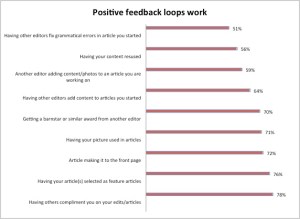“Our brains and our behavior are driven by feedback loops. Harness their power and change your life,” points out Wired magazine in its latest cover story on how feedback can be used to change human behavior. Similarly, data from the Wikipedia Editor Survey, April 2011, shows that feedback from other editors – especially positive feedback – encourages more editing. According to the survey, Wikipedia editors reported that positive interactions and experiences with others made them more likely to edit Wikipedia, and, as a direct corollary, negative interactions and experiences made them less likely to edit Wikipedia.
The majority of editors pointed out that positive interactions (having grammatical errors fixed by another editor, receiving compliments and barnstars from fellow editors, and experiencing “their” article make it to front page) made them more likely to edit Wikipedia.

While positive interactions create positive feedback loops that encourage editing, negative interactions reduce the likelihood of editing. These interactions include the perception of being looked down upon by other editors, as well as seeing edits reverted without any explanation.

Fortunately for our community, every listed action leading to a negative feedback loop is an easy fix: treat other editors with respect and encourage their growth as a contributor, and every negative trend we see here could literally disappear. So please, Wikipedia editors, continue doing the good work and providing positive feedback to your fellow editors. The successful growth of our project depends on it.
Mani Pande, Head of Global Development Research
(This is the fourth in series of blog posts where we will share insights from the April 2011 Editors Survey)

Can you help us translate this article?
In order for this article to reach as many people as possible we would like your help. Can you translate this article to get the message out?
Start translation